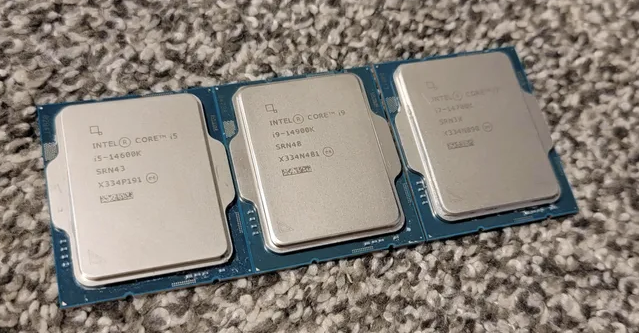Intel 13th and 14th Gen 'Raptor Lake' instability troubles: Everything you need to know
Serious stability issues that cropped up in early February continue to dog Intel's latest chips, a challenge to the company's efforts to regain the throne of the chip-making industry it helped create.

Get Tom's Hardware's best news and in-depth reviews, straight to your inbox.
You are now subscribed
Your newsletter sign-up was successful
Serious stability issues that cropped up in early February continue to dog Intel's latest chips, a challenge to the company's efforts to keep the throne of the chip-making industry it helped create.
Intel recently said that it had discovered the root cause of the problem — and plans a microcode patch to fix it — but damage to the company's reputation is harder to paper over. One recent report revealed that Intel’s 13th Generation Raptor Lake processors have a return rate four times higher than that of the previous generation. At the same time, the 14th Generation Raptor Lake Refresh chips also have return rates thrice as high as the 12th Generation Alder Lake processors — suggesting the current issues Intel faces might spiral into a business nightmare.
Just getting up to speed? Here's a brief history of the problem:
July 22: Intel has announced that it has found the root cause of the crashing issues plaguing its CPUs. The company will issue a microcode update to address the issues by mid-August, ostensibly ending the long-running saga that began when the first sporadic reports of CPU crashing errors surfaced in December 2022 and grew to a crescendo by the end of 2023.
July 16: Amid mounting frustration over Intel's inability to resolve its Raptor Lake instability problems, game development studio Alderon Games revealed on its website that the company has had nonstop problems with Intel's 13th and 14th-generation processors in its servers, development systems, and customers' gaming PCs. The issues have become so prevalent that Alderon Games publicly stated that Intel sells defective 13th and 14th-generation CPUs.
June 14: Reports swirled that Intel had identified the root of the problem. Alas, it was not so. "Contrary to recent media reports, Intel has not confirmed the root cause and is continuing, with its partners, to investigate user reports regarding instability issues on unlocked Intel Core 13th and 14th generation (K/KF/KS) desktop processors," Intel said in a statement to Tom's Hardware.
April 30: Intel released guidelines to its board partners regarding default BIOS settings to alleviate stability issues that some 13th and 14th-Gen Core i9 CPU owners are experiencing. The new guidelines encompass recommended settings board makers should use to increase stability. Intel stated that the root cause of the stability issues has not been investigated. It was also careful to not blame its board partners for the aforementioned instability issues.
April 27: A message originally destined for motherboard manufacturers sought to clarify the ongoing troubles, which may have been laid at the feet of motherboard manufacturers racing to become 'the fastest' performer through over-aggressive voltages that allowed higher clock speeds.
April 20: Asus was the first to release a BIOS patch adding a setting aptly named 'Intel Baseline Profile,' which switches from the motherboard's default settings to the ones recommended by Intel. It was in response to widespread crashes and another instability issue with certain games using Unreal Engine 5, precisely when it initiates shaders during the loading screen. The problem was hardly resolved, however.
Feb. 23: Increasing numbers of Core i9-13900K and Core i7-13700K users reported crashes in some of the latest games, usually accompanied by an out-of-video memory error. It's not just random end-users, either: Tom's Hardware's GPU reviewer personally experienced this issue.
Get Tom's Hardware's best news and in-depth reviews, straight to your inbox.
"Intel is aware of reports regarding Intel Core 13th and 14th Gen unlocked desktop processors experiencing issues with certain workloads," the company told us. "We’re engaged with our partners and are conducting analysis of the reported issues."

After 25 years covering the technology industry, Jeremy Kaplan is a familiar face in the media world. As Content Director for Tom's Hardware, he oversees product development and quality. He was formerly Editor in Chief of Digital Trends, where he transformed a niche publisher into one of the fastest growing properties in digital media. Before that, he spent half a decade at one of the largest news agencies in the world, and cut his teeth in magazine business, long before the birth of the iPhone. In 2019, he was named to the FOLIO: 100, which honors publishing professionals making an industry-wide impact.
-
noel_prg_la1979 Motherboard maker Microstar International has posted this announcement regarding the problems with 13th & 14th generation desktop Intel processors and how they will address the problems with updated BIOSes coming mid-August:Reply
Addressing Recent Intel Core 13th and 14th Gen Desktop Processor Instability -
_dawn_chorus_ "everything you need to know"Reply
Except what is actually the issue, or if it affects lower tier CPU's in those gens, or what potential damage is happening, or if there are any "bandaids" actions you can take to prevent further degradation..
This article is egregiously mistitled... -
Amdlova The non k version launch way before the K version... if something will have problem will be the K version.Reply
I have disable the c6 and c7 on my cpu... my board goes wild with the last bios update more coilwine than before.
Have something really wrong with c states more than the high voltage. -
mac_angel Are you going to retest all the CPUs and see if there's a performance impact?Reply
I think think you should test the latest few generations of CPUs and see if Hyper-threading is still relevant, especially for gaming.